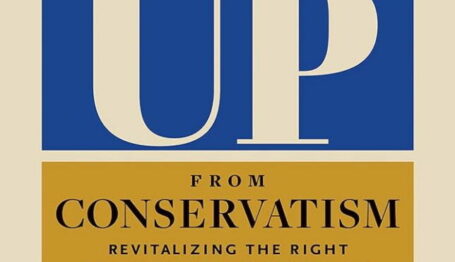Special Report
On the Question of Right Fights: “Grill Dad Republican”
 Credit: Macrovector. License: Shutterstock.
Credit: Macrovector. License: Shutterstock.

On the Question of Right Fights (full series)
Factions on the Right | Dueling Manifestos
National Conservatism at Arms | Postliberals for American Liberalism
“Grill Dad Republican”
“Grill Dad Republican”
What all this right-fighting ignores (on all sides) is the “Grill Dad Republican,” the ordinary voter who supports Republicans and professes some sort of conservatism. Exit polls suggest he (in the male sense) is disproportionately likely to be a military veteran without a college degree making more than $100,000 in middle-to-late-middle age who is married, owns a firearm, and does not belong (nor does his wife belong) to a labor union. That person is not somebody who is deeply involved in any of this right-fighting. Most likely, if he was old enough, he voted for George W. Bush twice, John McCain, Mitt Romney, and Donald Trump twice and does not see any contradiction therein. When considering right-fights, it is important to remember on the one hand how unimportant they might actually be.
But the right-fighters will staff administrations, support congressional offices, and model the next round of suitors for Grill Dad’s vote. So one must consider the risks of each faction. They all risk decaying into something that fails to meet the needs of the conservative public or the country at large.
Integralism-Postliberalism might be little more than an intellectual fad in a country built on a Protestant skeleton and committed at least in name to freedom. The risk of a rising Postliberal faction is not that it takes over the Right but rather that it serves as a fellow traveler to the economic Left even as the economic Left works to deconstruct the social Right—something of which the New York Times, which praised Ahmari’s book multiple times, is probably well aware.
If Postliberalism wishes to be a constructive force on the right, it will have to learn to work within the bounds of American advocacy institutions as they are and American religiosity as it is, not as Postliberalism wishes they were. One could see a constructive Postliberalism offering proposals to smooth the rough edges of the market economy, promoting religious observance in a broader cultural manner, or devising schemes to ease the burden on parents.
Freedom Conservatism in decayed form might be illustrated by some of its statement’s signers: Alyssa Farah Griffin of The View, Charlie Sykes of the Bulwark, and MSNBC analyst and former Maryland Lieutenant Governor Michael Steele, to pick three. Their “freedom conservatism” might devolve into some form of intentional do-nothing-ism, policy paralysis, or even outright collaboration with the Left. (Like some National Conservative institutions, the Bulwark is no stranger to donations from liberal billionaire mega-donor Pierre Omidyar’s philanthropic nexus.) Are Freedom Conservatives willing to fight the Left when a fight is right? To many, that question is open.
At its best, Freedom Conservatism offers a positive vision for all people, releasing human potential by getting out of its way. A dynamic Freedom Conservatism would campaign against the regulatory state and curtail its power when the electorate gives it the authority, devolve questions not needed to be decided by the federal Leviathan to the lowest possible level, and bring the nation’s books into balance, ideally (because institutional analysis is a thing) at the expense of conservatism’s institutional adversaries to the extent possible.
National Conservatism in its devolved state focuses so firmly on controlling demographics that it becomes indistinguishable from the racial determinism it seeks to overthrow, just in the service of whites rather than ethnic minorities. It also risks fighting allies for the sake of fighting allies. One could argue, as some National Conservatives do, that Progress Pride flags flying at U.S. missions abroad is an inevitable consequence of George W. Bush–era Wilsonian foreign policy. To suggest that any conservative wants that outcome, as some National Conservatives have, is tendentious.
A better approach would be to recommit to Rufo-style colorblindness and promote neutral rules that effect conservative ends. To deal with Pride flags at government buildings, National Conservatives should promote rules proscribing governmental endorsements of nongovernmental flags of all kinds, like the left-wing, majority-Muslim city council in Hamtramck, Michigan, did.
And all factions must be aware of the role of representative democracy—small-r republicanism. For all its assertions that the adoption of contemporary sexual non-ethics (what Scott Yenor calls “the queer constitution”) was a top-down project, that adoption was ratified by representative democracy. Perhaps no National Conservative proposition is a greater heap of raw, unseasoned broccoli than demanding state action to undo the contraceptive revolution, whatever one thinks of that revolution itself. But lest Freedom Conservatives get too cocky, they also wish to serve the broccoli of entitlement reform, which has claimed more than one political career.
In truth, while I hope the Freedom Conservatives come out with more of what they want where it conflicts with the other factions, all factions are probably necessary to effect real-world policy, with give-and-take inevitable. The reality of the American political system is that the two great national political movements given life in the two major political parties must struggle within themselves as much as against the other. So the right-fighting will continue. If it stops, then the Right will really have a problem: It will have ceased to exist.



